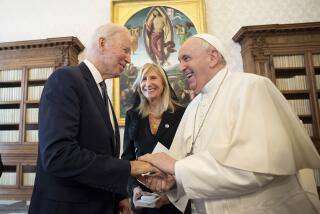Theologians Call for Church Truce in Proselytizing
- Share via
Decrying the combative “dark side” of their churches’ relations in developing nations, a joint commission of Roman Catholic and Pentecostal theologians on Tuesday condemned as unethical efforts to lure away followers amid mockery of one another’s beliefs.
The commission urged forgiveness and cooperation between the two very different Christian traditions, which have waged a war of words in recent decades, especially in Latin America, where Pentecostal church groups have grown rapidly in traditionally Catholic countries.
An international theological dialogue, encouraged by the Vatican, recently resulted in the completion of an eight-year study of practical problems by distinguishing manipulative proselytizing from straightforward evangelism--with the goal of ending the “scandal” of Christian infighting.
Now the trick will be to make sure the 30-page document will have actual impact out in the field. The commission’s report has no binding authority over either Catholicism, with its elaborate bureaucracy and tight doctrinal discipline, or the independent churches of Pentecostalism, a movement of churches that say the Holy Spirit enables them to speak in tongues, heal the sick and detect satanic influences.
“Some will say this is idealistic,” said dialogue co-chairman Cecil M. Robeck Jr., an Assemblies of God member who teaches at Fuller Theological Seminary in Pasadena. “But if we can get along and settle issues, I hope other people can take this as a useful model.”
The Vatican has fostered many theological dialogues since the landmark Second Vatican Council of the mid-1960s.
Late last month, Lutheran and Catholic theologians announced a basic consensus on the doctrine of justification by faith alone, a key dividing point in the 16th century Protestant Reformation. The agreement was a “tremendous milestone,” said Cardinal Edward Cassidy, who heads the Pontifical Council for Promoting Christian Unity.
The start of the worldwide Pentecostal movement within Christianity is usually traced by historians back to the 1906-1909 Azusa Street Revival in Los Angeles, where hundreds of Christians, white and black, who sought to be “baptized in the Holy Spirit,” signaled by speaking in an unknown language, flocked to a rundown wooden building in what is now Little Tokyo.
*
Although scorned for decades by many American churchgoers as uneducated, emotional “Holy Rollers,” Pentecostal and so-called charismatic Christians have gained broad acceptance in church circles and American conservative politics in the last 25 years.
But in Latin America, Africa and some parts of Asia, the aggressive tactics of some Pentecostal evangelists and churches have sparked name-calling disputes with the long-established Catholic Church.
In countries such as Brazil and Guatemala, the religious disputes have become enmeshed with economic and political battles for power.
The two groups “have an angry history,” said Father Kilian McDonnell, a Benedictine priest-theologian who co-chaired the dialogue with Robeck. McDonnell heads the Institute for Ecumenical and Cultural Research at St. John’s Abbey in Collegeville, Minn.
The document said that “Catholics are affronted when some Pentecostals assume that they are not even Christians,” and Pentecostals are offended when they are called “rapacious wolves” stealing from the Catholic flock.
“It’s a major scandal when Christians who serve the same Lord are at each other’s throats, and that in turn calls into question the credibility of the Gospel,” McDonnell said.
The theologians defined illegitimate proselytizing as “a disrespectful, insensitive and uncharitable effort to transfer the allegiance of a Christian” from one church to another.
Examples of intellectual dishonesty include “willful misrepresentation” of another group’s beliefs, psychological or social intimidation and “the exaggeration of biblical promises,” they said. Some new Pentecostal churches preach a “prosperity Gospel,” promising health and wealth for truly committed believers.
*
Although in a few places, such as northeast Zimbabwe, Pentecostalism may be the established church and Catholic missions the newcomers, it is usually the other way around. Catholic leaders say that Pentecostal missionaries often show no appreciation for their years of struggle to establish a Christian culture--sometimes at the price of martyrdom.
“Courtesy would seem to call for some communication with the leaders of the older church by the new evangelizers,” wrote the theologians.
Nevertheless, the six dialogue participants--including two priests from the Pontifical Council for Promoting Christian Unity--wrote that evangelism is legitimate when aimed at non-Christians and those “who apparently live a life totally indifferent to the faith they have professed.” They also noted “the delicacy of making judgments” on whether a professed Christian is indeed indifferent to faith.
The crusades of evangelist Billy Graham were cited as “an important model” for sensitive proclamation of the Gospel. “He organizes such campaigns only after he has sought the support and agreement of the churches in the area,” the document said.
By clearing up confusion between proselytizing and evangelism, Catholic and Pentecostal leaders would promote “religious liberty [as] a civil right,” the statement said. Moreover, they should stand together against laws in countries where Christian evangelism is banned, the theologians said.
*
The Catholic-Pentecostal theological dialogue marked its first 25 years one year ago when Robeck, McDonnell and other participants spoke at the Vatican with Pope John Paul II about the upcoming agreement. Although the participants--which also included Canadian Ronald Kydd of Eastern Pentecostal Bible College in Peterborough, Canada, and the Rev. Steve Overman of the Eugene, Ore., Faith Center--technically speak only for themselves, the findings will be published by the Vatican in English, French and Spanish, and by two Pentecostal academic journals, Robeck said.
“The document will get a lot of attention, even from those who do not agree with us,” McDonnell said.
More to Read
Sign up for Essential California
The most important California stories and recommendations in your inbox every morning.
You may occasionally receive promotional content from the Los Angeles Times.













